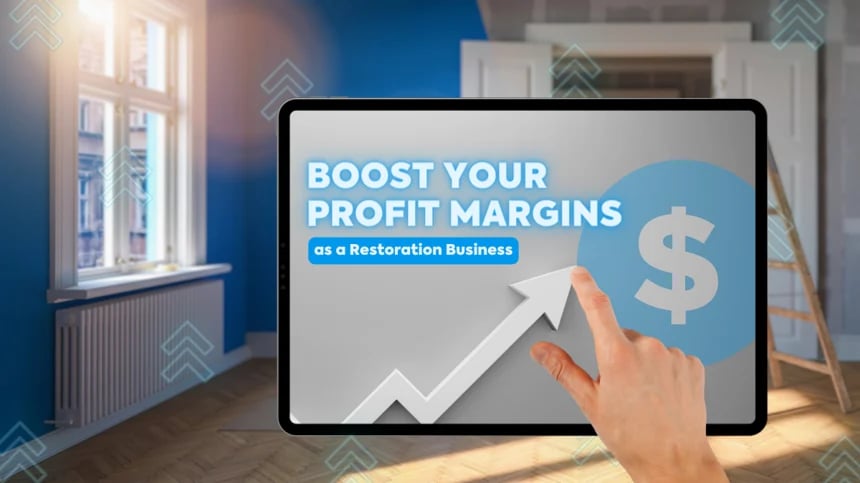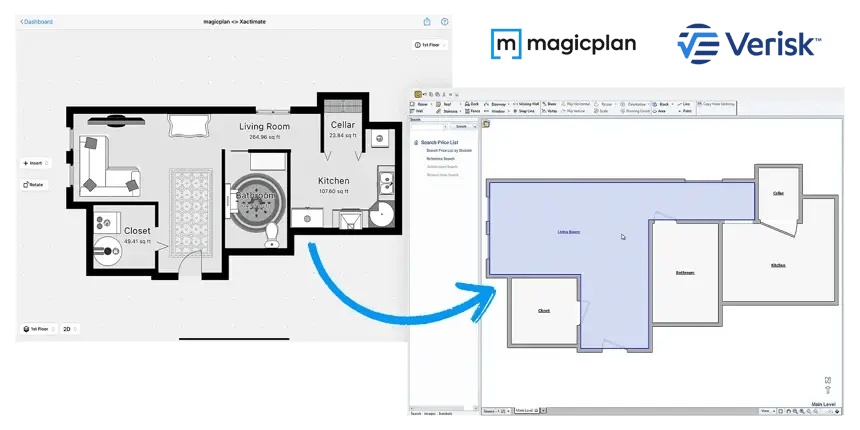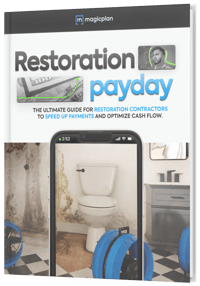Restoration
12 Proven Strategies to Boost Profit Margins as a Restoration Business

Increasing profits in your restoration business comes down to taking concrete steps, making clear decisions, and being ready to change and get better constantly. This guide isn't just another list of tips; it's a roadmap for real growth, perfect for anyone eager to revamp their business, explore new ideas, and much more. Let's dive in.
1. Getting the Scope Right
Accurate job scoping is critical. It ensures you charge appropriately for the work you do, avoiding underestimations that leave money on the table or overestimations that could cost you business. Dive into the details, understand the scope fully, and leverage technology to get accurate measurements and assessments.
Tip: Take a water damage job. Overlooking hidden moisture in a crawl space could mean a callback, eating into your profit. Employing thermal imaging cameras and moisture meters can reveal unseen issues. Additionally, using an app to document all fieldwork and findings allows for broader team involvement, even from those not on-site. This approach helps ensure your estimates are comprehensive, safeguarding your profit margin by covering all bases.
2. Broadening Your Horizons and Specializing in Niche Services
Think bigger. Why stick to the same old when you can offer more? It's like adding more tools to your toolbox. Every new service is another way to catch a customer's eye, but sometimes, the best opportunities are in the places most folks overlook. Find your niche, and own it. Be the go-to expert, and watch as the demand for your specialized services grows.
Tip: Adding asbestos removal or lead paint abatement can set you apart. Consider a property restoration after a fire. If you can also handle hazardous materials safely, you're not just a contractor; you're a one-stop solution.
3. Training Your Estimators
Your estimators are your front liners in making sure you're hitting the numbers right. Keep them sharp with the latest know-how.
Tip: It's not just about knowing the cost of materials but understanding the complexity of restoration work. Estimators trained in the latest construction and restoration techniques can predict potential complications before they arise, making estimates more accurate and trustworthy.
4. Invest in Technology
Keeping up with the latest tools and software is key for any restoration business looking to stay competitive. From project management to accurate job estimates and improving how you communicate with clients, the right technology can make a big difference. It makes your work faster, more accurate, and can help your business grow by handling more jobs with less guesswork.
Tip: Imagine you're at a job site. With tools like magicplan, you can sketch out jobs in real time, document everything, and whip up estimates on the fly. Plus, with the app's smooth integration with estimating tools like Xactimate® and CoreLogic, you're not just fast; you're efficient by sending your sketches and photos directly.
5. Improve Negotiation Skills and Handle Change Orders Like a Pro
Change orders don't have to be a headache. With a bit of savvy negotiating and a clear process, you can turn them into opportunities instead of obstacles. It's all about staying flexible and keeping the dialogue open.
Tip: Say halfway through repairing water damage, you find mold. With a clear change order process, you can quickly get approval for the extra work. Keep communication open with the client and document everything to ensure transparency.
6. Pricing It Right
Charging more doesn't mean ripping off your customers, and at the same time, competing on price can be a race to the bottom. Instead, emphasize the value you bring. Highlight what sets your service apart, like quicker turnaround times, superior materials, or outstanding customer service.
Tip: Thoroughly documenting your work and presenting it effectively to adjusters and insurers ensures you can justify your charges and secure full payment without disputes.
LEARN MORE: Best Practices for Selecting and Applying Line Items in Xactimate®
7. Improve Operational Efficiency
Whether it's cutting down on waste or optimizing your team's workflow, every little bit adds up. Think lean, move fast.
Tip: Every minute counts. By carefully analyzing your job workflow and documenting every detail, you ensure that the equipment is correctly sized, which speeds up drying in water damage jobs. This not only reduces costs by avoiding the use of unnecessary equipment that insurance won't cover but also frees up your team to focus on their core tasks.
8. Leverage Industry Standards
Industry standards are more than just requirements; they're the foundation for validating your pricing and maintaining confidence in your quotes.
Tip: Industry standards give your estimates credibility. This is especially useful when you're in discussions with an adjuster skeptical about your estimate, helping to ensure your work is accurately valued and compensated.
LEARN MORE: ANSI/IICRC S500 Standard for Water Damage Restoration
9. Expand Geographic Reach
Don't be afraid to step out of your comfort zone. New markets mean new opportunities. It's like fishing in a bigger pond.
Tip: New markets can be gold mines. Consider targeting a nearby town with limited restoration services; by doing so, you position yourself as the primary expert rather than just another choice. A strategic move often involves partnering with contractors in different areas to effectively extend your business reach, akin to a franchise model.
10. Form Strategic Partnerships
Going solo is tough. But with the right partners, you can unlock new doors. Think of it as teaming up for success.
Tip: A good partner can be the bridge to new business. Maybe there's a construction firm that doesn't handle water damage. By partnering, you both win: they have someone to refer to for restoration, and you get new business.
11. Amping Up Your Online Presence
In today's world, if you're not online, you're invisible. Use social media and your website to shout from the digital rooftops. Show off your work, share your successes, and draw in those looking for exactly what you offer.
Tip: Consider your online presence as your digital storefront, crucial for drawing attention. It's important to embrace and understand the variety of digital marketing strategies available, from SEO and paid advertisements to enhance visibility, to sharing before-and-after photos and client testimonials. Regularly updating your content not only builds credibility but also attracts clients seeking the quality of work you offer.
12. Offer Comprehensive Maintenance Plan
Keep them coming back by offering maintenance plans to keep your customers in the loop long after the job's done. It's not just about the one-off projects; it's about building relationships that last.
Tip: Maintenance isn't just about preventing future damage; it's about keeping your brand top of mind. When you offer annual check-ups, you're creating a touchpoint that keeps customers engaged and more likely to turn to you when they need more extensive work done.
Ready to Grow?
To effectively implement each strategy, start by creating a checklist and action plan. Set specific timelines and tasks for each area you want to improve, such as upgrading technology, training staff, or expanding your market reach. Assign clear responsibilities and deadlines to ensure progress can be tracked and measured. Regularly review and adjust your plan as needed, based on outcomes and feedback.
LEARN MORE ABOUT GAINING EFFICIENCY:
9 Reasons Why Every Restoration Contractor Should Go Paperless
Related articles
featured
/Claims Adjuster
/Restoration
Xactimate, Cotality, QuickBooks, T&M: When and How to Use Each Effectively
featured
/Restoration
Running Lean: How 2-Person Restoration Crews Can Run Like Pros
featured
/Restoration
The Definitive Restoration Workflow Guide: How to Make Every Job Flow Seamlessly

Zuzanna Geib
Team Lead Marketing

